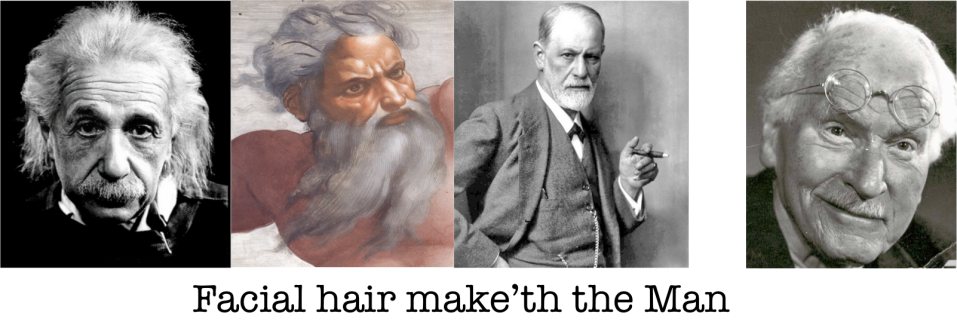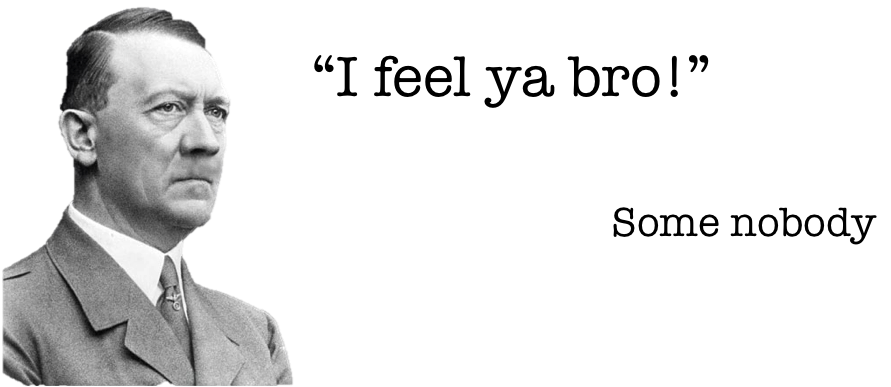He said what?! Misquoting Einstein
It was Carl Jung who first posited the existence of psychological archetypes, innate elements of our collective unconscious that are so fundamental to the human mind, they are manifest in all cultures and traditions. These archetypes, as Jung argues are inherent threads weaved into the fabric of human conciousness, shared by all of us in a pool of collective thought which endures in perpetuity as long as there are humans to think. Well known examples of these (even though, if Jung is right, they should all be by definition well known) include the mother, father, child, devil, god, the trickster, hero and the wise old man.
According to Jung; history, culture, art, literature are all imbued with manifestations of these archetypes. Perhaps Jung himself had desired the archetype of the wise old man to be bestowed upon himself? After all he was infamous among his peers for not been content to merely doggy paddle in the shallow waters of psychology, but instead to pontificated epigrams and aphorisms from the numinous stratosphere of philosophy and spirituality. Yet if only he had heeded his own psychological musings, he would have realised that he did not posses the requisite degree of facial hair to become a vessel for the archetype of the wise old man. Perhaps one reason why Freud is held in higher esteem today is that he simply had the psychological foresight to grow a bombastic beard?
Although Jung’s notion of the collective unconsciousness has been largely dismissed by modern psychologists, in many ways the internet can be seen as humanity’s collective digital conciousness. Looking at it through Jung’s archetype tinted spectacles, it is easy to see that humanity’s collective psychological yearning for a wise old man is fulfilled in spades by the appropriation of Time Magazine’s man of the 20th Century, Albert Einstein.
Think about it, why is it that the image of Einstein tattoo’d into the collective concious of society, is one of him when he is elderly? In reality, he was at the apex of his intellectual prowess and completed the work that sky rocketed him into the scientific firmament, when he was only 26 years old.
It is because the elderly Einstein, brandishing a silver-white mane and magniloquent moustache, conforms to Jung’s archetype of the wise old man. And it is this which enables Einstein to be the perfect posthumous vessel for a plethora of platitudinous quotes, which he has absolutely no record of ever uttering. As Abraham Lincoln once said, “The problem with quotes on the internet is that you can’t be sure of their accuracy.”
A platitude is only ever really as good as the person expounding it, and what better way to resuscitate the corpse of an overused sentiment then by bellowing it through the mouth of a figure who embodies wisdom, sagacity and intellect?
The term genius is often overused, however, if one were to attempt to restore it’s meaning to it’s original poignancy, Einstein would no doubt be an axiomatic, reference point for this aim. His ambulant mind was in it’s element traversing the mystifying landscape of space-time, mining the deep mysteries of the universe and undertaking the most rigorous psychoanalysis of the metaphorical mind of God.
Yet, for seem reason we believe that this outstanding aptitude for physics, qualifies Einstein to be the bona-fide voice on issues ranging from spirituality and psychiatry to art and politics. Of course it’s really his moustache and grey hair that qualify him for this task, and the fact that if God is dead as Nietzsche thus spoke, then there are few other people in modern times who qualifies for the job.
Ask yourself the question do you think Einstein would be taken as seriously as an orater on life if he did not sport the thick moustache and celestial white hair?
Perhaps, also it is the sheer neutrality and abstract nature of physics, which has allowed Einstein to become the de facto Yoda of the internet meme-verse. Physics is perceived as one of the few disciplines which embodies pure, raw, uncoloured intellect, and due to it’s incomprehensible nature to most people it does not ruffle any ideological feathers. This is why there are no General Relativity deniers (Pastafarians not withstanding) as there are deniers of Evolution, as the latter all too uncomfortably reminds the ironically un-meek of their humble origins. Although as Psychics treads ever closer to the origin of the universe, expect this to change.
It is precisely because Einstein is not perceived as been aligned with any particular ideology, or epistemological belief system, except genius in its most distilled form, that it is all the easier to appropriate him as a legitimising, venerable mouth piece for a gaggle of ideologies, viewpoints and quotes.
Out of the following three quotes, can you guess which one was actually spoken by Einstein?
“Creativity without imagination is blind, imagination without creativity is empty”
“Not everything that can be counted counts, and not everything that counts can be counted”
“Life is like riding a bicycle. To keep your balance you must keep moving”
The correct answer is 3, congratulations if you got it right, you win the prize of smugness you clever little devil you.
Perhaps the most insidious of Einstein misquotations is the following video where a Professor’s scepticism in God is demolished by the precocious intellect of a young student, Albert Einstein.
This video, is nothing more than a cynical and philosophically incoherent attempt to push a religious agenda, using the credibility of Einstein to patch over the weaknesses of its argument. There is no evidence whatsoever that this exchange took place, and in fact the message contradicts Einstein’s own words on the topic of religion and God:
“It was, of course, a lie what you read about my religious convictions, a lie which is being systematically repeated. I do not believe in a personal God and I have never denied this but have expressed it clearly. If something is in me which can be called religious then it is the unbounded admiration for the structure of the world so far as our science can reveal it.” Albert Einstein, in a letter March 24, 1954; from Albert Einstein the Human Side, Helen Dukas and Banesh Hoffman, eds., Princeton, New Jersey: Princeton University Press, 1981, p. 43.
I will finish this post in traditional Blog fashion with a top x things of a thing ever list.
The top 5 Einstein misquotations
1. The definition of insanity is doing the same thing over and over and expecting different results.
Einstein never said this. And lets hope Freud or Jung didn’t either as it is the definition practice and hard work, not insanity. The Ultimate Quotable Einstein originally attributes this quote to the 1983 book ‘Sudden Death’ by Rita Mae Brown.
2. Everyone is a genius. But if you judge a fish by its ability to climb a tree, it will live its whole life believing that it is stupid.
Einstein never said it and…
Your move Mr Misquotation.
3. “Logic will get you from A to B. Imagination will take you everywhere.”
Imagination may take you to many places, (though to get to Stoke On Trent, you still need to take the M6) but this quote will not get you back to Einstein.
4. “I fear the day that technology will surpass our human interaction. The world will have a generation of idiots.”
This one is self evidently false, and obviously panders to the anachronistic whims of Luddites who are intimidated by their children’s capacity to communicate with others electronically. No known original source has been found for this quote, but it sounds like something my nan would say, so let’s say it was her.
5. “Religion without science is blind, science without religion is lame.”
Not strictly a misquotation, but rather a misinterpreted quote. This quote from a 1930 New York Times article that Einstein penned, is often seen as supporting his belief in God. However if you continue to read the article he goes on to explain that he defines religion not as pertaining to a personal God, but to describing the condition whereby man becomes less egocentric and more aware of super-personal objects and goals.
…a person who is religiously enlightened appears to me to be one who has, to the best of his ability, liberated himself from the fetters of his selfish desires and is preoccupied with thoughts, feelings and aspirations to which he clings because of their super-personal value. It seems to me that what is important is the force of this superpersonal content … regardless of whether any attempt is made to unite this content with a Divine Being, for otherwise it would not be possible to count Buddha and Spinoza as religious personalities. Accordingly a religious person is devout in the sense that he has no doubt of the significance of those super-personal objects and goals which neither require nor are capable of rational foundation … In this sense religion is the age-old endeavor of mankind to become clearly and completely conscious of these values and goals and constantly to strengthen and extend their effect. If one conceives of religion and science according to these definitions then a conflict between them appears impossible. For science can only ascertain what is, but not what should be…






Pingback: He Said What? Top 5 Einstein Misquotations | The Spice Rack
With increasing world-wide cynicism of the church and religion, I’m not surprised we seek out Einstein’s quotes. Anyone so clever on a scientific level could not have been a mental laggard on others.
Having said that, I am heartened by Einstein’s troubles at school and early career prospects (now you have me worried, perhaps they aren’t true?) Not in the way of Shadenfreude, but in optimistic hope for us all.
Interesting about the beard, they don’t show Audrey Hepburn at an older age, do they?.
Thanks for your comment 🙂 That’s a really good point about female icons only being remembered in their physical prime. Makes me appreciate actresses like Meryl Streep who has managed to keep in the limelight as she sages.